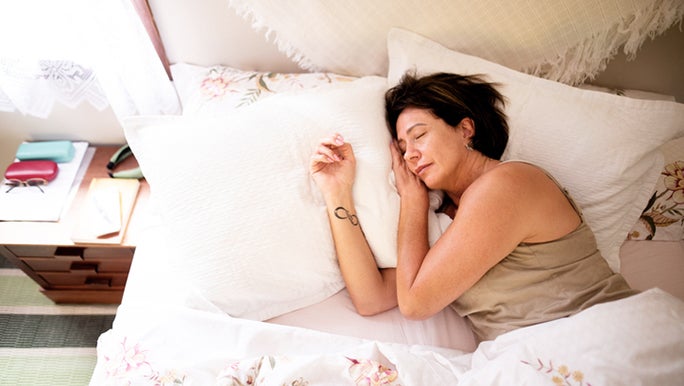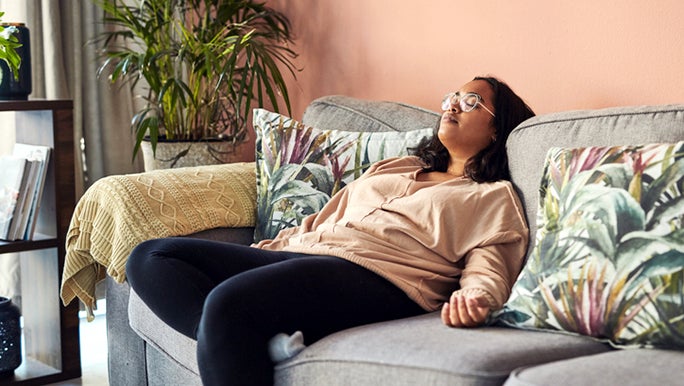What is sleep & why do we need it?

Key Points
- Sleep is vital for our overall health and wellbeing.
- Like oxygen, water and food, we need sleep to survive.
- Practising the five principles of good sleep health can improve your sleep.
Know any humans who can sleep standing up? Neither do we. Getting horizontal each night and drifting into sweet slumber is as fundamental to wellness as eating well and exercising, yet many of us struggle to sleep well. We all know how amazing we can feel after a deliciously deep sleep, but exactly why is it so essential for your overall health and wellbeing?
Let’s take a closer look at what makes a good kip and why we need it to function well.
What is sleep?
Sleep is an altered state of consciousness that is much busier than it seems. We spoke to CEO of the Sleep Health Foundation and healthylife Advisory Board member Dr Moira Junge, a registered practising Health Psychologist, about all things sleep.
“Sleep is an altered state of consciousness, but it’s a very active state,” she says. “So much happens during the night with our movement, our dreaming, secretions of growth hormones, memory consolidation… it’s an essential pillar of health.
“In theory, when we get enough sleep, we can remain alert during the day to live our lives. Historically, like our primitive ancestors who had to stay alert to hunt and gather and be aware of predators, our needs are essentially the same today. We need sleep so we can fulfill our roles in life.”
During sleep, our brains actively play housekeeper to several essential functions that help us live healthier and happier lives. These essential functions include:
- rest and restoration
- tissue and muscle repair
- immune system regulation
- hormone secretion, including stress hormone regulation
Dr Moira Junge explains the connection between sleep and memory.
“Sleep plays a very strong and clear role in brain memory consolidation. We know that if you’ve been at school, at uni or in an all-day course and you’ve had a sleep, you’ll retain that information more than the people who haven’t slept.”
Recent findings also suggest that our brains house an intriguing waste-management mechanism called the glymphatic system. This system eliminates metabolic waste from the brain that naturally builds up each day while we sleep.
Why is this important? Because evidence suggests that a lagging glymphatic system may play a role in neurodegeneration and certain brain disorders.
And of course, lying down gives our bodies a chance to rest physically.
“When we’re lying flat, we’re not fighting gravity anymore,” Dr Moira says. “That doesn’t differentiate sleep from rest, but it’s part of it. I don’t know any humans who sleep standing up. Some animals do, but we really can’t. We have to be lying down – it’s all part of the rest and restoration.”
The different stages of sleep
Sleep is governed by our circadian rhythms and biological clocks, and it cycles between two main phases: REM sleep and non-REM sleep.
REM sleep
REM (rapid eye movement) occurs about 90 minutes after you nod off and is (as the name would suggest), characterised by rapid eye movements. It’s a lighter and more active stage of sleep where your body acts similarly to when you’re awake.
REM sleep is associated with dreaming, memory consolidation, emotional regulation, brain development and helping you prepare for the day ahead. When you get enough sleep, this stage recurs multiple times throughout the night, with each subsequent REM period getting longer.
So, how much REM sleep do you need? Newborns and children with developing brains need more REM sleep than adults, who need around two hours per day.
Non-REM sleep
Non-REM sleep comprises three stages that gradually become slower and deeper as the night wears on. You might recognise this stage thanks to muscle twitches, hypnic jerks or the sensation of falling.
As we slide into a deeper non-REM sleep, our heartbeat and breathing slow, and our brain activity shifts into a different gear. In this relaxed state, blood flow increases to the muscles, tissues grow and repair themselves, and the body releases hormones to regulate stress, appetite and growth.
While we still have a lot to learn about the nature and function of sleep, we do know that getting adequate sleep is vital for your health.

We usually shift through four to six sleep cycles before we wake in the morning
What is a healthy sleep cycle?
A typical sleep cycle, considered healthy or ‘normal’, occurs every 90 to 100 minutes and consists of alternating REM and non-REM sleep stages. Usually, we shift through four to six sleep cycles each night.
Is 6 hours of sleep enough?
This is a common question, but the short answer is: it depends. It’s not as simple as getting 6 hours of sleep or more. The quantity you need can vary based on factors including your age, genetics and lifestyle.
The Australian Sleep Health Foundation recommends adults aim for 7 to 9 hours of sleep each night. However, this amount varies for children, teenagers and older people, who tend to sleep more lightly and nap regularly.
How much sleep do we need?
Below are the current Australian sleep recommendations listed by age:
- Newborns (0–3 months): 14–17 hours
- Infants (4–11 months): 12–15 hours
- Toddlers (1–2 years): 11–14 hours
- Preschoolers (3–5 years): 10–13 hours
- School-aged children (6–13 years): 9–11 hours
- Teenagers (14–17 years): 8–10 hours
- Young adults (18–25 years): 7–9 hours
- Adults (26–64 years): 7–9 hours
- Older adults (65+ years): 7–8
Please note that these are general guidelines, and individual sleep needs may vary.

Broken sleep may have numerous health impacts, including difficulty functioning during the day
What happens if we don’t sleep?
Like oxygen, water and food, we need sleep to survive. Dealing with a continued pattern of broken sleep or counting sheep night after night can have numerous impacts on your health.
Research shows that people who don’t get enough sleep are more likely to:
- find it hard to perform daily activities
- underperform at school and work
- experience behavioural and emotional challenges
- exhibit increased risk-taking behaviour
- develop chronic health problems
Is good sleep eluding you?
If you feel like you could do with some more shut-eye, you’re not alone. A report by the Australian Institute of Health and Welfare estimated that:
- Nearly half (48%) of all Australian adults experienced at least two sleep-related problems.
- 27% of 12- to 13-year-olds and 52% of 16- to 17-year-olds were not getting enough sleep on school nights.
- Women are more likely to have insomnia, while men are more likely to have obstructive sleep apnoea.
Poor sleep can be influenced by our daily habits and choices, like smoking, enjoying an extra cup of coffee or scrolling your favourite app ‘one more time’ before bed. But it’s not just excess that might impact your sleep.
“How you sleep can depend on your job, what’s happening in your household, how you cope with stress, what you consume and how often you exercise, among other things,” says Dr Moira. “And for some people, there are systematic factors they can’t control.”
Of course, good sleep can be hard to achieve when life is busy, or stress levels run high. Fortunately, there are many things you can do to improve your sleep, starting with developing sleep habits and routines that work for your body.
5 sleeping tips to try this week
There is no one-size-fits-all tip or trick to catching more of those glorious ZZZs. Instead, Dr Moira recommends practising the five principles of good sleep health and improving your sleep hygiene.
The five principles developed and written by Dr Espie, a Professor of Sleep Medicine at Oxford University, encourage people to value, prioritise, personalise, trust and protect their sleep.
1. Value your sleep
Understanding the crucial role of sleep in your overall health and wellbeing is the first step towards taking it more seriously. When you think of sleep as an investment rather than a chore or basic need, it becomes easier to value this essential physiological process.
2. Prioritise better sleep
Did you sacrifice sleep for a few hours of alone time, free from the kids or other responsibilities? You’re not alone – sleep procrastination is the real deal. Studies show that up to 59.5% of people procrastinate once they get into bed, while others do their best stalling before jumping between the sheets.
If that sounds like you, give yourself permission to stop scrolling, step away from the TV and shift the way you wind down. This will help you edge your way towards longer, more restorative sleep.
For some people, like shift workers and new parents, prioritising sleep might involve declining social events, setting boundaries around self-care or taking naps when the opportunities arise.
3. Personalise your sleep
This step is all about figuring out what works for you – finding that sweet spot between just enough sleep and too much sleep.
Are you a night owl or an early bird? It may be helpful to explore your chronotype and adjust your testing schedule to find a sleep pattern that works for you.
4. Trust the process
Once you’ve found your pattern, it’s time to tune into your body. Instead of stifling yawns and pushing on, honour your body’s signals when it’s time to rest. Stick to the pattern where possible and try not to force sleep. Trust that your healthier sleep habits can help you hit the hay sooner. It can also mean don’t hit the panic button when you wake overnight, trust that your body and brain will eventually lead you back into the land of sleep.
5. Protect your sleep
Sleep thrives on a pattern, so protect your sleep from changes when and where possible. Become a creature of sleep habit who sleeps and rises around the same time each day and practises good sleep hygiene.

Aim for 7 to 9 hours of sleep per night and you’ll reap the benefits
Before you hit play on the next episode, remember this
Science shows that quality sleep is essential for our overall health and wellbeing, and most adults need 7 to 9 hours of sleep each night. By adopting healthier sleep habits and a personalised sleep schedule, you’ll edge one dream closer to enjoying deeper, more restorative sleep.
If you’re experiencing sleep difficulties, consult your healthcare professional.
Related:
- Why is sleep important and what are the benefits?
- Is catching up on sleep possible?
- Understanding your circadian rhythm
Dr Moira Junge, a healthylife Advisory Board member, is a registered practising Health Psychologist with the added specialty of sleep. She has been in private practice for over 20 years and is the CEO of the Sleep Health Foundation and was a founding member of the Behavioural Management of Sleep Disorders Committee within the Australasian Sleep Association (ASA). Dr Moira was also Chair of the ASA Insomnia and Sleep Health Council (2008-2015) and is a full member of the Australian Psychological Society.
Reviewed by the healthylife Advisory Board March 2023.